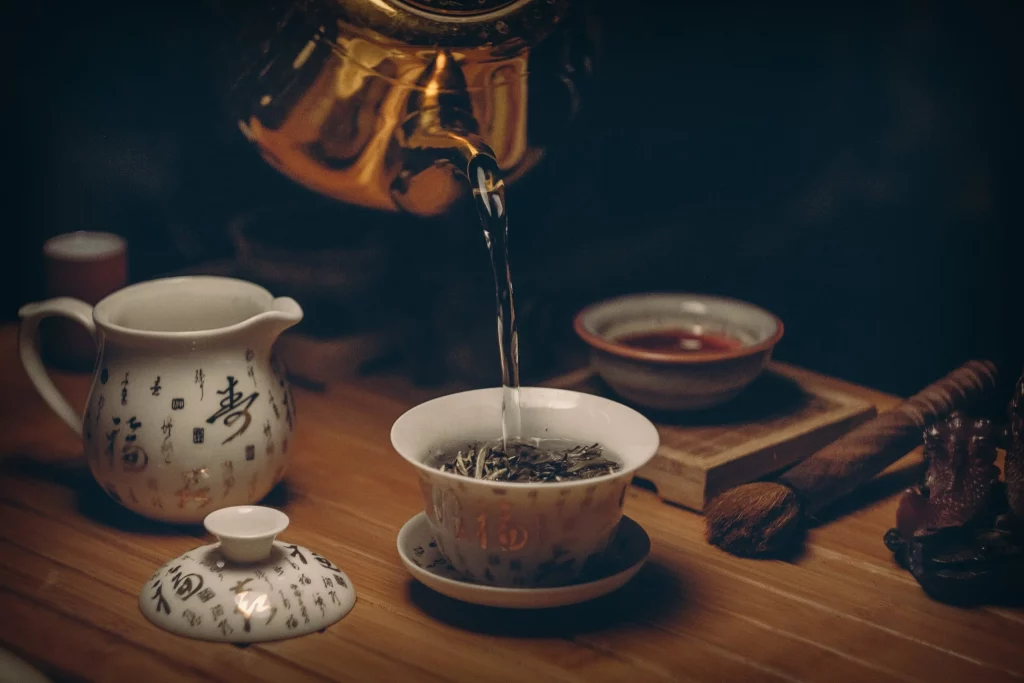If there’s one thing I’ve learned from my years of being a self-proclaimed green tea guru, it’s that this leafy brew is more than just a drink; it’s a lifestyle. Remember that time I tried to substitute all my water intake with green tea for a week? Let’s just say it was a ‘refreshing‘ experience, in more ways than one.
But hey, you live and you learn, right? Have you ever wondered what secrets lie within those delicate green leaves? Well, buckle up, because I’m about to spill the tea (what a pun) on some surprising facts that even the most seasoned tea experts might not know.
Where there’s tea, there’s hope.
Arthur Wing Pinero
Green Tea Facts
Are you ready to dive into the rich and refreshing realm of facts about green tea? Remember, there’s a quiz at the end, so keep your eyes peeled for every detail!
- Green tea originates from China and has been used for thousands of years.
- The Camellia sinensis plant is used to produce green tea.
- Steaming or pan-frying the leaves prevents oxidation and gives green tea its unique flavor.
- Green tea contains antioxidants known as catechins, particularly epigallocatechin gallate (EGCG).
- Regular consumption of green tea is linked to lower risks of cardiovascular diseases.
- Green tea can enhance brain function due to its caffeine and L-theanine content.
- It is believed to aid in weight loss by boosting metabolic rate.
- Green tea may lower the risk of some types of cancer.
- The tea is used in traditional Chinese and Indian medicine for various health issues.
- Matcha, a type of green tea, involves grinding the whole leaf into powder, offering a more concentrated form of tea.
- Green tea’s flavor can range from grass-like and toasty to floral and sweet.
- It contains vitamins like Vitamin B2 and Vitamin E.
- Green tea is often consumed for its relaxing effects, attributed to the amino acid L-theanine.

- Decaffeinated green tea options are available for those sensitive to caffeine.
- The brewing temperature for green tea is typically lower than for black tea to avoid bitterness.
- Green tea can improve dental health by reducing bacteria and acidity in the mouth.
- It might lower the risk of type 2 diabetes by improving insulin sensitivity.
- Green tea is a popular ingredient in cosmetics due to its anti-inflammatory properties.
- It can also improve skin health and help with acne control.
- Countries like Japan, China, and Korea have unique varieties and preparations of green tea.
- Green tea’s leaves are often rolled, twisted, or shaped during processing.
- Longjing or Dragon Well is a famous variety of green tea from China.
- Sencha, Gyokuro, and Bancha are popular types of Japanese green tea.
- Cold-brewing green tea can reduce its caffeine content and bitterness.
- Tea ceremonies in Japan often incorporate the preparation and consumption of green tea.
- Some studies suggest green tea can reduce bad breath due to its antibacterial properties.
- Green tea may help reduce the risk of Alzheimer’s and Parkinson’s diseases.
- It can boost the immune system thanks to its anti-inflammatory and antioxidant qualities.

- Green tea bags and loose leaf tea offer different experiences in terms of flavor and convenience.
- Using fresh, pure water is recommended for the best taste in brewing green tea.
- Green tea can be a healthy alternative to sugary drinks.
- It contains a variety of minerals that are important for health.
- Over-brewing green tea can result in a bitter taste.
- Some people use green tea as a natural remedy for headaches and fatigue.
- Green tea leaves are typically harvested by hand for high-quality teas.
- It can be paired with foods like sushi or desserts to enhance flavor experiences.
- Storage conditions greatly affect the shelf life and quality of green tea.
- Green tea powders are used in cooking and baking for flavor and color.
- It may help in reducing the risk of stroke.

- First flush green tea, made from the first harvest, is considered the highest quality.
- Some green teas contain floral or herbal infusions for added flavor.
- Green tea is a source of natural fluoride, which is beneficial for teeth.
- Organic green tea options are widely available, offering a more natural product.
- The color of green tea can vary from pale green to bright yellow.
- Green tea is also used in traditional skin care rituals in East Asia.
- It may play a role in lowering cholesterol levels.
- Kombucha, a fermented tea drink, often uses green tea as a base.
- Green tea can be used in aromatherapy and bath products for its soothing aroma.
- The polyphenols in green tea can protect against ultraviolet rays.
- Shincha, or “new tea,” is a special Japanese green tea harvested early in the season.
Green Tea Myths

It’s time to separate fact from fiction. Is it good, or does it cause dehydration? Let’s put together some popular myths about green tea and see what the truth is.
- Green Tea Causes Dehydration
While green tea contains caffeine, which can have a diuretic effect, it contains a relatively low amount compared to coffee. Drinking green tea in moderation actually contributes to your daily fluid intake, helping to keep you hydrated. - Drinking Green Tea Leads to Significant Weight Loss
Green tea can slightly boost metabolism and fat burning, but the effects are modest when it comes to actual weight loss. A healthy diet and regular exercise are far more effective. - Green Tea is Harsh on the Stomach
Some people may experience stomach upset when drinking green tea on an empty stomach, but this is not a common reaction. Green tea is generally gentle and can even aid in digestion for many. - More Green Tea Equals More Health Benefits
Moderation is key! Excessive consumption of green tea can lead to side effects due to its caffeine and tannin content. Most experts consider consuming about 2-3 cups a day safe and beneficial for most people. - Green Tea is Caffeine-Free
Green tea does contain caffeine, though in smaller amounts compared to black tea and coffee. It’s a good option for those looking to reduce their caffeine intake without cutting it out completely.
No products found.
Green Tea Quotes

With deep Chinese history, there are many popular quotes and proverbs about it. Enjoy some of the most popular ones with me.
Green tea is the elixir of life.
Unknown
This quote reflects the deep historical and cultural significance of green tea in Chinese society. Many revere it not just as a beverage but as a vital component of traditional medicine and wellness practices.
Drinking a daily cup of tea will surely starve the apothecary.
Unknown
This saying highlights the belief in green tea’s medicinal properties. It suggests that regular consumption of green tea can lead to better health and reduce the need for medical interventions.
There is something in the nature of tea that leads us into a world of quiet contemplation.
Lin Yutang
Lin Yutang, a renowned Chinese writer, emphasizes the calming and meditative aspects of drinking green tea. This quote captures the serene experience many associate with enjoying a cup of tea.
Better to be deprived of food for three days, than tea for one.
Chinese Proverb
This proverb underscores the essential role of tea, particularly green tea, in Chinese culture. People consider it a necessity, more important than food, emphasizing its integral place in daily life.
Tea is liquid wisdom.
Unknown
While not specifically about green tea, people often associate this quote with it due to its popularity. It speaks to the clarity and peace of mind many feel when they take the time to enjoy a cup of tea, reflecting the beverage’s role in promoting mindfulness and reflection.
Green Tea FAQ

Now that we’ve journeyed through myths and facts, let’s check out some of the frequently asked questions about green tea. Pay close attention to details, such as the process of making green tea, as understanding them will be the key to acing the upcoming quiz!
- Is Green Tea Healthy?
Totally! It’s full of antioxidants, great for your heart and brain, and might even lower cancer risk. But, as with anything, don’t overdo it. - What is Green Tea?
It’s a tea from the Camellia sinensis plant. Green tea skips the oxidation process, keeping its green color and giving it a lighter taste. - Is Green Tea Good for Weight Loss?
Yeah, it can help. Green tea boosts metabolism a bit and helps burn fat, especially when you’re working out. But don’t forget to eat healthy and stay active too! - How is Green Tea Made?
After picking the leaves, workers heat, roll, and dry them. The heating step is crucial to stop oxidation, which keeps the leaves green and preserves the flavor. - What are the Benefits of Drinking Green Tea?
Loads! It sharpens your brain, helps shed some weight, protects your heart, and might even keep cancer at bay. Plus, it’s calming – great for easing stress.
No products found.
Green Tea Quiz

Are you ready to brew up some answers in the Green Tea Quiz? Fail to answer correctly, and you’ll find your dreams invaded by dancing tea leaves tonight!
Conclusion
Well, there you have it! We’ve steeped ourselves deep into the world of green tea, from its leafy origins to its steamy benefits. Who knew that these little leaves could pack such a punch?
So, next time you’re sipping on that earthy elixir, remember: you’re not just drinking tea; you’re sipping on centuries of history, health, and a hint of magic. What’s your wildest green tea experience? Did it involve yoga, a book club, or perhaps a daring attempt at making your own blend?
3 Sources Used For This ArticleAll You Need To Know About Japanese Green Tea – Oishya
Green Tea – Moutsinai


